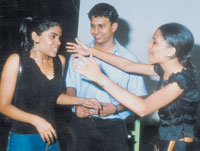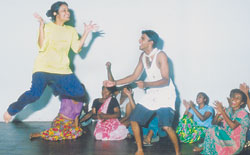| Mirror
Magazine |
||||
|
‘a
poet, a puppet and papadam’ promises to be highly entertaining He was cut short by a very matter-of-fact SKC, “Stop being simplistic machang, let’s get to the point.” Turning to me, he continued, “You see, Ru (as the ‘inner circle’, I am told, refers to director Ruwanthie de Chickera) has asked us all to leave the rehearsal.” OK, I say, if that is the case, maybe I should go inside to check things out. They promptly block my way, and using the insight I gathered from my colleague who quit the previous assignment, I relented. “Let’s talk now,” says SKC. “We were thrown out, well, asked to leave because the actors became very insecure,” says Urvashi. “And they should be,” adds SKC, “it’s so difficult to play me! Now, Travis, on the other hand is not so difficult to portray...” The ‘rather simplistic, over enthusiastic, glorified peon’ is obviously being pushed around quite a bit. The production is very novel, and the approach to the media is even more extraordinary. Usually, we meet the actors of the play. In this case, I only spoke to the characters that are portrayed in the two one-act plays this production comprises. I am already aware that Travis, Urvashi and SKC are ‘characters’ and not actors, and I didn’t waste the opportunity to let them know I was. “Some students from the University of Colombo are acting in and members of the Stages Theatre Group are involved with helping with the play, which is about me,” continues SKC, obviously hogging the show. “Err, I am in it too, it’s called The Blind Poet, and SKC and I are part of an advertising and promotion team,” adds Travis. The conversation is interrupted by the lady with the green flower, Urvashi, “Wait a minute please, the first play is about ME!! It’s called The Jony and Urvashi Show, and I am the star performer in it!” I now understand the plight of my colleague. We will take it one play at a time, so that you are all given equal coverage, I tell them. “But only I am important,” SKC retorts; for obvious reasons, I choose to ignore the comment. And so we talk about ‘a poet, a puppet and papadam…’ There’s a poet in the second play, a puppet in the first… but why ‘papadam’?? “That is our best-guarded secret to date, and you have to see the play to find out,” I am told. The production comprises two one-act plays each focusing on an artiste facing a crisis regarding his art. Both plays capture the essence of life in Sri Lankan society with both subtle and not-so-subtle humour. The first of them, titled The Jony and Urvashi Show, is about a puppet, Urvashi, and a ventriloquist, Jony, who, as a part of their show enact tales of travel in the bus to those commuters who gather at the bus depot. “My character is very important,” explains a loud-mouthed Urvashi. “I obviously take centre-stage,” she shrieked. I wanted to tell her that I wasn’t deaf, but decided against it. The play has an essentially Sri-Lankan flavour to it, and most ‘Bus Katta Katha’ are real-life incidents experienced on the many different bus routes in Sri Lanka. The story reaches its climax when it is discovered that the street performer Jony is diagnosed with throat cancer, and is given the choice of giving up his show to save his life. “Enough about that woman,” comes the interruption I was almost waiting for. Obsessed with being in the limelight, SKC tactlessly suggests that we should now talk about the second play, “where I am the star, and which is all about the subliminal message.” The Blind Poet tells the story of MultiFlex, a rather new ‘Events Promotion’ agency, whose annual felicitation ceremony for artistes is almost always a flop. As for the reason for these regular flops, the findings of Travis point to the fact that those who are being felicitated don’t show up for the ceremony. The situation has to be changed, or they risk losing the funding for the show. With the looming threat of the cash being diverted by its sponsor Dias Goonaratne, for the furtherance of montessoris and mini-zoos, the promotion team comprising the over-bearing SKC, the absolute nincompoop of a Travis and the affected Sulo (whose only two options of biding time seem to be either fixing her hair or meddling with a phone), have to come up with ideas of making it a crowd-puller. The remedy to keep the show going is to ‘localise’ the felicitation ceremony, and the team has come up with the options of appreciating the contributions of a local sitarist, a painter, a cricketer, a dance troupe called the Agony Auntys, who were discovered at an Interact Talent Contest and of course the focus of the play, a blind poet. On the suggestion of the over-enthusiastic Travis, the old and ailing blind poet Lionel Abeyweera, is visited. As his feeble conditions prevent him from attending the ceremony, it is agreed that his wife (on his behalf) should make it to the felicitation that would give him fresh hope of recognition and appreciation. The stage has been set for the felicitation ceremony, and what ensues is a comedy in itself. The play is the perfect comedy combined with wit, the conventional ‘affected’ gestures, and superficial squeals by Mano, the head of MultiFlex, making it all the more entertaining. Although the ‘characters’ of the play are obviously very Difficult to handle (and I mean Difficult with a capital D), the two plays themselves are a perfect blend of wit, sarcasm and that Sri Lankan way of doing things that we are familiar with. As a reporter, I realise that equal coverage ought to be given to all the important characters of a play, in the standard preview that readers are accustomed to, but in this case I beg to differ. Rather, I am compelled to differ… What is it that a reporter can do when the ‘characters’ hog the show, and the actors are not allowed the exposure to the media, owing to the fact of course that the characters are just a trifle too self-obsessed? Or maybe, (as SKC would say) the intention is to get the ‘subliminal’ message to come through – you have to go and ‘see’ the play – I mean, if the characters are so interesting and diverse, to say the least, a portrayal of them would surely be something worth watching. So, make your way to see ‘a poet, a puppet and papadam’ at the Lionel Wendt Theatre any day between January 23 and 26. “It’s starts at 7.15 p.m., and they have to buy the tickets,” I am told by SKC. “Really?? I had no idea,” I reply. I’m through with being nice to them!! |
||||
Copyright © 2001 Wijeya Newspapers
Ltd. All rights reserved. |
 I
was warned that this would be one of my toughest assignments. Making
my way to a rehearsal of this new play in town titled ‘a poet,
a puppet and papadam’, I was stopped even before being allowed
into the practice hall by three suspicious-looking characters, who
insisted that I should write about no one else, and nothing else,
but them. It was mentioned in the brief that the play was being
presented by the University of Colombo and the Stages Theatre Group;
these ‘characters’ obviously didn’t look as if
they belonged to either of the two groups.
I
was warned that this would be one of my toughest assignments. Making
my way to a rehearsal of this new play in town titled ‘a poet,
a puppet and papadam’, I was stopped even before being allowed
into the practice hall by three suspicious-looking characters, who
insisted that I should write about no one else, and nothing else,
but them. It was mentioned in the brief that the play was being
presented by the University of Colombo and the Stages Theatre Group;
these ‘characters’ obviously didn’t look as if
they belonged to either of the two groups. “Hello,
I’m SKC,” said one of them in very conspicuous pink
shades, adding, “You must be the new reporter - we were informed
that the other one had quit.” My colleague in journalism had
dolefully given up the whole idea of covering this new play, owing
to the fact that these three characters were very ‘difficult’
to handle. One of the other two, a woman with a green flower, extended
her hand to say (or was it to shriek?), “Hello, I’m
Urvashi, and there’s no one else like me.” “How
do you do,” I replied, before being introduced to what looked
like an over-enthusiastic executive named Travis, who promptly pulled
out his notebook (after he had adjusted his bright blue tie) to
make short notes. “I see you have brought a Dictaphone ma’am,”
he said excitedly, “that would make things a lot easier, the
other reporter didn’t have one, and I offered to buy her one
from the duty-free...”
“Hello,
I’m SKC,” said one of them in very conspicuous pink
shades, adding, “You must be the new reporter - we were informed
that the other one had quit.” My colleague in journalism had
dolefully given up the whole idea of covering this new play, owing
to the fact that these three characters were very ‘difficult’
to handle. One of the other two, a woman with a green flower, extended
her hand to say (or was it to shriek?), “Hello, I’m
Urvashi, and there’s no one else like me.” “How
do you do,” I replied, before being introduced to what looked
like an over-enthusiastic executive named Travis, who promptly pulled
out his notebook (after he had adjusted his bright blue tie) to
make short notes. “I see you have brought a Dictaphone ma’am,”
he said excitedly, “that would make things a lot easier, the
other reporter didn’t have one, and I offered to buy her one
from the duty-free...”